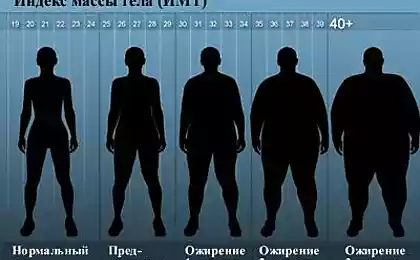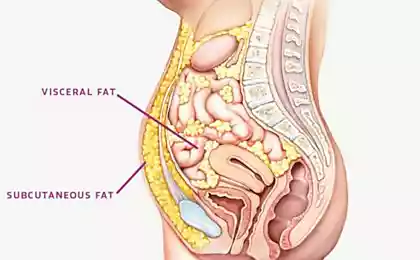668
Do not read at dinner the articles about losing weight!
Working with eating disorders and excess/insufficient weight as a mental and physical problem, I used to believe nothing in the word until, until voiced the fact not confirmed in several studies made by different researchers on different samples.
Therefore all that write for this reason I invented not by me, but drawn in studies and confirmed by my own experience with such patients.
1. About "successfully thinner"
"On average, they eat 1400 kcalorie per day. And at least an hour a day doing sports. You can? Well then you will succeed."
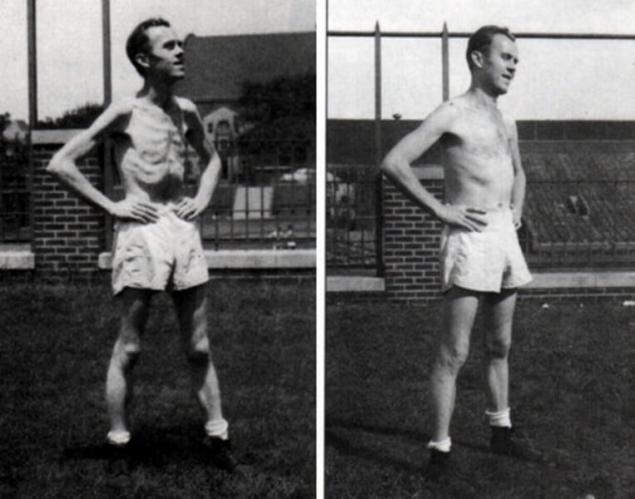
According to Minessota the fasting experiment of Alan Keyes, who is being held in 1945, is still the "gold standard" of studies investigating the effect of hunger on the psyche and the human body, when the diet of the experimental group on 1570 calories a day (this mode in the study was semi-starving, polovodovo) the effects of such food were as follows.
First, subjects experienced a significant decrease in strength and endurance.
Tireless Kiz measured this figure with the dynamometer and found that the strength of the subjects decreased by 21%. The participants complained that the constant freeze and get tired quickly. Was evident and mental changes. Since the test group consisted entirely of men, constantly living on the territory of the laboratory, at first, they quickly formed a “club of interests”, discussing news, politics, sports. With the beginning of the “hungry phase” it appeared that the interest in it have almost disappeared, moreover, even sex and intimacy seemed lost for them its appeal.
Instead, they have a single, comprehensive, all-consuming interest.
FOOD.
Some of the participants began to study cookbooks and spend hours (!) to view photos of various dishes. Some began to collect recipes. It reminds nothing to you? This behavior is very common for people, beginners “eat right” or settled on the diet, which is essentially the same. Suddenly, all the interests were forgotten, and the food becomes the main priority.
“The most important moments of the day were the highlights of the meals. They are very annoyed if the food was supplied at least with a small delay, or they had too long to stand in line."
Despite the fact that the food was cooked as simply as possible, the party she seemed divine to the taste. They enjoyed each SIP. Often they “made soup” from the food — cooked food diluted with water — in order to seem like its more than it actually is”.
The story of the soup reminds me of the statement of one would-the Creator of the popular a few years diet — the prefix “mountain” I used exactly as intended, for as long as Russia does not have another, super popular dietary movement that destroyed the normal diet of hundreds of people, the majority of patients who have dietary result of experience developed symptoms of an eating disorder. Most often, compulsive overeating or paroxysmal, rarely bulimia was, having tried this “scientifically based” diet.
So, describing the delights of a comfortable and safe weight loss, this grief-the dietician stressed that, adding to almost any dish large vegetable salad, you will not increase the calorie content significantly, but can eat MUCH MORE. Needless to say that the dietician followed their own system of power, through which he was able to reduce acquired at a fairly young age is excess weight. She yearned, poor soul.
Not stopping at that wonderful point that to lose weight we often teach people with experience of disordered nutrition, I want to emphasize that for someone whose eating behavior is absolutely great, in a very short-term restriction in food can be of some use.
Remember how great sex when you failed to reconnect a week or more. How much novelty, as sharp sensations.
With food the same thing happens - once in terms of restriction of food for a day or two, on a trip, at a party, you start to appreciate and savor every morsel of food available to you. This experience is used in schools of meditation to increase awareness in nutrition.
The key is your food behavior in this case must be perfectly healthy to take these limits are very long, it should happen quite rarely. As shown Minnesotsky hungry experiment, the continuation of such experience not only leads to bouts of overeating.
After a short time, the subjects voluntarily consented to participate in this experience to help a huge number of people who survived the famine during the war — that is, their motivation was not money or fame, but to help others, and this is the highest level of motivation began to beat.
“The stress of starvation was excessive experience for one of the participants in the experiment, Franklin Watkins. He began to see a live, full-time graphic kannibalistskih nightmares in which he ate the meat of the body of an elderly man. Going out for a walk in the city, he was eating ice cream and drinking it's milk shakes. In the end, Keyes called him to talk. Watkins confessed to cheating, crying, and then flew into a rage and threatening to kill Keyes and himself. Keyes immediately cease participation in the experiment, Watkins and sent him to a secure psychiatric hospital. There, within a few days of normal power supply. Watkins had completely recovered and was discharged. It happened just a few weeks later after the beginning of the starvation phase of the experiment.
Let me remind you that this was absolutely physically and mentally healthy male that has passed a thorough medical examination before participating in the experiment.
Keyes also found the pulse of the participants significantly decreased from 55 beats per minute to 35. It was one of the signs of a slowing metabolism, a desperate attempt of the body to cut energy waste and save some calories. The chair of the participants was rare — not more than once a week. Blood volume decreased by 10%, reduced heart size. The participants had swelling in the body start to stay water. Ankles, hands, face, knees became swollen, although the rest of the body looked very thin.
Decreased base, or residual metabolism of the participants — not less than 40%. The body continued to adjust to a reduced consumption in order to survive and maintain integrity. Other symptoms include dizziness, muscle pain, poor coordination, ringing in the ears. One of the amazing features was the “whitening” of the eyeballs due to the reduction in size of the blood vessels. The skin became coarse, rough, and the subjects complained about the absence of fat mass — it was painful and uncomfortable to sit.
Through the experiment Keyes, were able to identify and describe the main symptoms which our body develops in a state of hungry exhaustion:
So to me it was strange to read a description of heroically lost weight and holding the weight of people who eat 1400 calories a day. Because it is absolutely not enough. You and I, with high probability will not be able to withstand such a diet simply because of the bodily and mental consequences are too devastating.
People who manage to do this in a number of biological (characteristics and changes of the microbiome in the weight loss process in the first place), metabolic (changes of absorption in the process of weight loss) and psychological reasons (the ability to reach so disastrous a result of hunger. But, on the contrary, to experience a euphoric state from hunger, and to function in a state of exhaustion better, not worse, with the symptoms of anorexia nervosa) is able to bear.
This is not heroism, not will power, I see no reason to admire such features of biology. They occur in a few percent of the population. Those who are genetically managed to be born and already with a low weight develop anorexia and die. Those who are born larger, reduce weight and sustain the hunger strike. All of this is an evolutionary mechanism for survival of humanity in a situation of lack of food, the nomadic tribes units, whose activity in lean periods increased, led to eating all weak and passive from hunger the other and saved the tribe from starvation.
2. "The set-point is increased to your max weight and stays there forever."
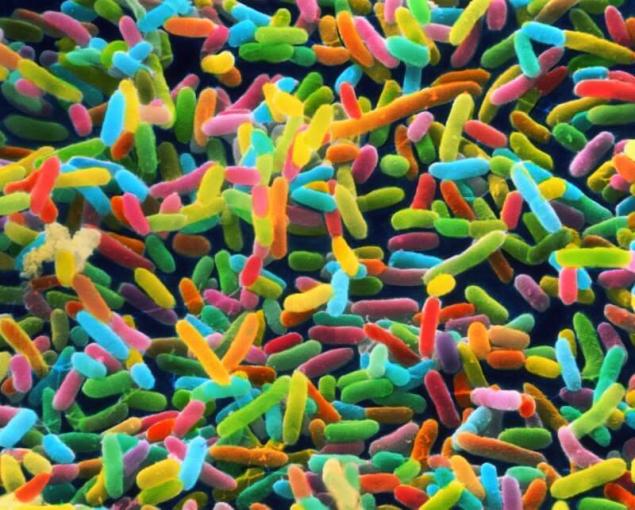
I was extremely surprised to read that the set-point a 3-pound newborn — 3 kg. actually, the set-point is not hard-coded number on the scales and a weight range within which the weight can fluctuate.
The newborn he, for example, from 2.5 kg to 3,800. Losing weight up to 2.5 kg, the baby is still active and cheerful, having to 3800 — will also feel great. It all depends on how he will eat, his metabolism... again, microbiome. In the presence of a particular combination of bacteria in the intestines baby will tend to gain weight and active there, and the other combination will have a worse appetite and lower the ability to gain fat.
With the introduction of dietary restrictions set-point confidence increases. That is, limiting the power and throwing off 6-8 pounds, you a while proud and keen to buy new clothes, and then — almost inevitably — gaining 8-10 lbs. at this point your set-point really improved.
He rises not from the fact that you gained weight, and the fact that you were sitting on a diet and weight ARTIFICIALLY reduced.
If you gain weight because some time for some reason overeat, your set-point changes little. How do I know? All from the same studies.
In addition to experiments examining the effects of hunger, studies have been conducted, studying the effects of systematic overfeeding. Scientists wondered what would happen to people if you feed them more than their energy needs, and limit their physical activity to zero?
The experimental group was made by the prisoners of American prisons. They were fed a diet containing 10 000 kcal a day, for 4-6 months. It is 4 times higher than the norm of 2500 kcal, which is considered standard for adult white men.
In the result, test subjects gained significantly less weight than expected by the researchers, and how they tried, they couldn't get really a lot. Moreover, it was found that to keep it up during the "overfeeding" the weight is very hard to keep — he wanted to return to the previous, the usual.
Conclusion? Weight not so much depends on how much we eat (and how overeat), as from genetically specified parameters.
Later Sims with his team repeated this experiment on student volunteers, which is not limited in any way physical activity. None of the participants could not have achieved the features of obesity — they simply couldn't recover enough.
Studies conducted on identical twins (favourite scientists model that allows to separate genetic influence on the studied factors and the influence of the environment) that were fed 1,000 calories more standard needs, appropriate gender and age for 100 days, showed similar results. The twins gained weight, but not kept.
Thus, the idea that your set point goes up when you gained weight, does not hold water. Your set point goes up when you sit on a diet, the next set is a reflection of what has occurred with your metabolism. So the phrase that you "somehow magically ate 40 kg, and now your set-point +40, and you no longer to be thin" is not outright lies, and pseudo-scientific deceit, the worst of lies. Allows and not to lie at all, and sell what you need.
Remember, please — you can't choose your own weight. Neither a plus nor a minus. You can't just, out of the blue, eat 40 lbs. Need a very good reason your body has decided that it is this all really necessary. And most often this reason is a previous hunger strike, that is an attempt to eat 1400 kcal a day and an hour every day to play sports".
3. "You made the biggest weight is your new set point (I mean the scored fat). And it's for life. We have no means to return these neural pathways in their original state."
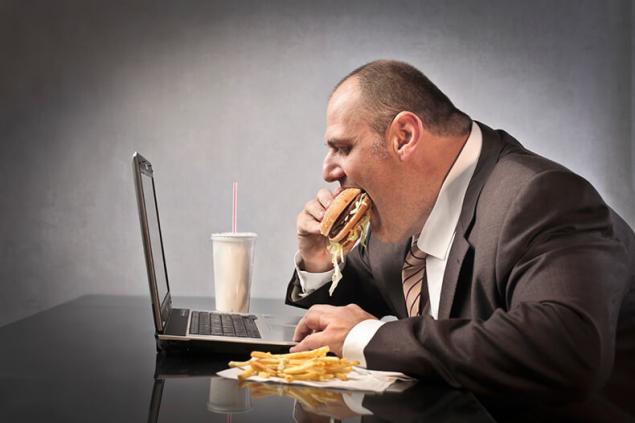
What did you think when you read it? That's right, "Oh, mommy. Stitch mouth". You know, this is an excellent thesis in order to make the text popular and often quoted, because fear is the Prime mover of sales. But that's not true.
A pregnant woman gaining 8 to 15 or more pounds in pregnancy. And with each pregnancy she again repeats this way. And if it does not interfere, not to pressure the need as soon as possible to "freshen up" if she has no symptoms of eating disorders, then it'll be back to your normal weight plus 2-3 kg, which leaves us with every pregnancy.
Your humble servant, mother of two children. In first pregnancy I gained 60 to 72 kg. According to the logic of the author of the quote, my body should permanently seek to 72 (my eldest son at birth weighed in at 2350, so to throw the weight of the fruit will fail). Son 12 years old, all my life I eat whatever I want, I'm very absent-minded athlete and for any price will not limit themselves in food.
But my weight is 63. What am I doing wrong? Further — more. The second pregnancy has uplifted my weight to 75 kg. While it lasted only 30 weeks, birth weight was 747 grams., the placenta is extremely small, water is not enough. All of this is somehow miraculously gave +15 kg to normal weight?
By this logic, all women who were with their premature babies in intensive care and very premature at the hospital where I spent 2 months, had to look significantly slimmer of his companions, who had undergone a normal pregnancy the average weight of a child in our unit was 1300 grams.
However, it was a normal birth women, with the same big bellies, potjazhelevshie, some more complete than others. Among my patients there are a few moms extremely premature infants. It so happened that women with more weight, although the logic of the author, they just had to be the most thin. But linear logic is there. where it comes to body weight. not working.
The biggest weight recruited me out of pregnancies, due to the very intense and prolonged stress is 68 kg. And again, my real weight is closer to my "permanent" than to "highest". When six months ago in the gym I was asked to measure body fat, it was at 21%. Just because 60 plus or minus a few pounds — my set-point, and as much as plus or minus about 3-5 kg, I'll weigh always.
A lot or a little from the point of view of the public — depends entirely on the cultural standard of beauty that I spit you suggest. Because from the point of view of the community of young, nulliparous glamorous anorectics-boulimiceski of fionas, I'm on the verge of obesity, and should not be confused with its greasy ugliness of their eyes.
From the point of view of the norms of Dutch medicine, my fat mass is at the lower limit of normal, and I have to be very mindful of nutrition. From my own point of view — my body knows better how much he needed fat, I do not have sufficient competence to interfere in it. I am 43 years old and in menopause is likely fat percentage is a bit more — with my hand enough not to overeat and leave the body to do its thing.
4. "Obesity — a chronic progressive disease".
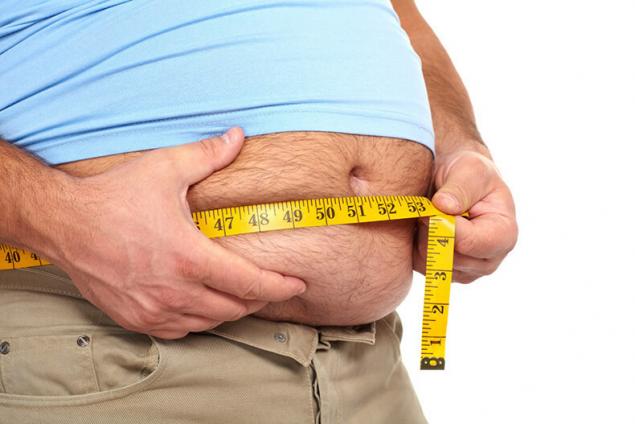
In today's strange world of medicine for a very long time not everything is determined by the good of the patient. Unfortunately. Sorry if upset. More determined by financial considerations, or the influence of one or another authoritative group of scientists, or the interests of pharmaceutical corporations.The doctor is not so need you to recover, and in fact, he rarely understands that you actually happening. Take a moment from the emotion that you have when you are reading this — anger, resentment, anxiety. Try to understand. As long as you live and hurt you the most successful client of medicine. So Yes, we'll live long, but — bad, the brilliant Belarusian thinker — right again.
This is bad news for us, the patients — but we should not idealize the medicine she needed to use it. It's a business. The same as any other, only very beneficial, because, again, fear is the best marketing. To live with this it is possible, if you use your head.
Medical decisions should be made by the patient, the doctor performs consulting and expert function. in Western medicine, this all goes — the doctor at the reception always asks: "do you think that with you?". Russian immigrants are outraged, and we should be happy. No one, as we do not understand and does not hear its own body.
In medicine there is ", abutalebi, community professionals, patology and medicalizing obesity. The reason is simple — it's incredibly financially beneficial. Investments that make the capitalist countries in research and development of methods for the treatment of obesity is so high that it is comparable with the revenues of the diet industry from the sale of diets (one of the reasons for mass obesity, by the way).
Conservative, that is, dietary treatment of obesity, bariatric surgery, the constant invention of new technical devices for the evacuation of body fat — the latter is a device to evacuate the contents of the stomach immediately after eating, that is, literally, a tool for bulimia, and against the introduction of this device has made the American Academy of eating Disorders, because it is incredibly damaging to the psyche.
No, abutalebi" — not my imagination, and I have not thought about that writes my esteemed colleague Traci Mann in his book "Secrets from the eating lab. Mann was just the scientist who summed up all that exist at that time, research diets, and found in them something in common: none of the studied diets did not work in the long term, up to 98% of each experimental sample recruited former weight.
The results were published in the journal "The American Psychologist". Then began interesting.
Mann describes that the presentation of these results made her a persona non grata among researchers of obesity. Stopped to say Hello. Her head is known and unique scientific laboratory with a lot of scientific publications are not invited to the conference. Haven't talked to her.
In addition to the emotional arguments, there are both rational. Obesity can be metabolically very healthy. The person formally meets the criteria of obesity may be more physically active and hardy than you. And this is what determines health. And there are not one, about 48% of people "obese", in fact they are enjoying. People physical health condition which does not differ from the health of people with normal weight.
A recent study caused a tremendous intensification "abutalebi", with the result that there was another study claiming that a greater weight corresponds to earlier mortality. Alas, this single study does not explain for many years the existing in science "the paradox of gioenia: people with excess, from the point of view of formal criteria, weight, live longer (the peak of prodoljitelnost life occurs when BMI 25-27, in some studies up to 33, after which the life expectancy curve lowers) and survive at a later age with various severe diseases (heart attacks, cancer) is much better.
This paradox can be explained only one: the world is not black and white, no need to demonize fat. The fat in our body has both lipotoxicity and lipoproteinami (protective) properties.
Causes of male infertility: treatment of deficit, leptin, insulin
Energy gymnastics hand from Yoshiro Tsutsumi
Consideration of man as a whole and analysis of the circumstances of life, as well as the genetic, microbiological, neurological, psychological factors allows you to understand if you need a specific person to lose weight or best to leave it alone.
I will add sacramental — not read at dinner the articles about losing weight, and especially of narration third person point of view fourth person. Read the study. They are more reliable.published
Source: svetlyachok.livejournal.com/889575.html
Therefore all that write for this reason I invented not by me, but drawn in studies and confirmed by my own experience with such patients.
1. About "successfully thinner"
"On average, they eat 1400 kcalorie per day. And at least an hour a day doing sports. You can? Well then you will succeed."

According to Minessota the fasting experiment of Alan Keyes, who is being held in 1945, is still the "gold standard" of studies investigating the effect of hunger on the psyche and the human body, when the diet of the experimental group on 1570 calories a day (this mode in the study was semi-starving, polovodovo) the effects of such food were as follows.
First, subjects experienced a significant decrease in strength and endurance.
Tireless Kiz measured this figure with the dynamometer and found that the strength of the subjects decreased by 21%. The participants complained that the constant freeze and get tired quickly. Was evident and mental changes. Since the test group consisted entirely of men, constantly living on the territory of the laboratory, at first, they quickly formed a “club of interests”, discussing news, politics, sports. With the beginning of the “hungry phase” it appeared that the interest in it have almost disappeared, moreover, even sex and intimacy seemed lost for them its appeal.
Instead, they have a single, comprehensive, all-consuming interest.
FOOD.
Some of the participants began to study cookbooks and spend hours (!) to view photos of various dishes. Some began to collect recipes. It reminds nothing to you? This behavior is very common for people, beginners “eat right” or settled on the diet, which is essentially the same. Suddenly, all the interests were forgotten, and the food becomes the main priority.
“The most important moments of the day were the highlights of the meals. They are very annoyed if the food was supplied at least with a small delay, or they had too long to stand in line."
Despite the fact that the food was cooked as simply as possible, the party she seemed divine to the taste. They enjoyed each SIP. Often they “made soup” from the food — cooked food diluted with water — in order to seem like its more than it actually is”.
The story of the soup reminds me of the statement of one would-the Creator of the popular a few years diet — the prefix “mountain” I used exactly as intended, for as long as Russia does not have another, super popular dietary movement that destroyed the normal diet of hundreds of people, the majority of patients who have dietary result of experience developed symptoms of an eating disorder. Most often, compulsive overeating or paroxysmal, rarely bulimia was, having tried this “scientifically based” diet.
So, describing the delights of a comfortable and safe weight loss, this grief-the dietician stressed that, adding to almost any dish large vegetable salad, you will not increase the calorie content significantly, but can eat MUCH MORE. Needless to say that the dietician followed their own system of power, through which he was able to reduce acquired at a fairly young age is excess weight. She yearned, poor soul.
Not stopping at that wonderful point that to lose weight we often teach people with experience of disordered nutrition, I want to emphasize that for someone whose eating behavior is absolutely great, in a very short-term restriction in food can be of some use.
Remember how great sex when you failed to reconnect a week or more. How much novelty, as sharp sensations.
With food the same thing happens - once in terms of restriction of food for a day or two, on a trip, at a party, you start to appreciate and savor every morsel of food available to you. This experience is used in schools of meditation to increase awareness in nutrition.
The key is your food behavior in this case must be perfectly healthy to take these limits are very long, it should happen quite rarely. As shown Minnesotsky hungry experiment, the continuation of such experience not only leads to bouts of overeating.
After a short time, the subjects voluntarily consented to participate in this experience to help a huge number of people who survived the famine during the war — that is, their motivation was not money or fame, but to help others, and this is the highest level of motivation began to beat.
“The stress of starvation was excessive experience for one of the participants in the experiment, Franklin Watkins. He began to see a live, full-time graphic kannibalistskih nightmares in which he ate the meat of the body of an elderly man. Going out for a walk in the city, he was eating ice cream and drinking it's milk shakes. In the end, Keyes called him to talk. Watkins confessed to cheating, crying, and then flew into a rage and threatening to kill Keyes and himself. Keyes immediately cease participation in the experiment, Watkins and sent him to a secure psychiatric hospital. There, within a few days of normal power supply. Watkins had completely recovered and was discharged. It happened just a few weeks later after the beginning of the starvation phase of the experiment.
Let me remind you that this was absolutely physically and mentally healthy male that has passed a thorough medical examination before participating in the experiment.
Keyes also found the pulse of the participants significantly decreased from 55 beats per minute to 35. It was one of the signs of a slowing metabolism, a desperate attempt of the body to cut energy waste and save some calories. The chair of the participants was rare — not more than once a week. Blood volume decreased by 10%, reduced heart size. The participants had swelling in the body start to stay water. Ankles, hands, face, knees became swollen, although the rest of the body looked very thin.
Decreased base, or residual metabolism of the participants — not less than 40%. The body continued to adjust to a reduced consumption in order to survive and maintain integrity. Other symptoms include dizziness, muscle pain, poor coordination, ringing in the ears. One of the amazing features was the “whitening” of the eyeballs due to the reduction in size of the blood vessels. The skin became coarse, rough, and the subjects complained about the absence of fat mass — it was painful and uncomfortable to sit.
Through the experiment Keyes, were able to identify and describe the main symptoms which our body develops in a state of hungry exhaustion:
- A tendency to weight gain when fed to the saturation level, namely, you gain weight even when I eat 2000 calories (kcal) or less per day:
- The lack of menstrual cycle in women or irregular cycle (which may be an indication that you too are practicing sports)
- Problems with skin, hair, nails — brittleness, dullness, fragility
- Anxiety and obsessive thoughts in connection with food
- Constantly depressed mood, nervousness, overexcitement”
- Problems with concentrating, “foggy”
- Bouts of overeating and breach of contact with the signals of hunger and fullness
- Frequent colds in connection with a reduction in immunity
- Mood swings, irritability
- The feeling of fatigue, drowsiness, weakness and dizziness
- Sleep problems, insomnia
- Decreased libido
- Cold hands and feet, feeling constantly cold
- Violations of digestion, constipation and diarrhea, nausea. stomach pain
- Strong sensitivity to certain types of food intolerance to one or the other (usual) food
- Bloating. especially after eating
- Water retention in the body (edema)
- Pain in joints, muscles, soreness of the skin
So to me it was strange to read a description of heroically lost weight and holding the weight of people who eat 1400 calories a day. Because it is absolutely not enough. You and I, with high probability will not be able to withstand such a diet simply because of the bodily and mental consequences are too devastating.
People who manage to do this in a number of biological (characteristics and changes of the microbiome in the weight loss process in the first place), metabolic (changes of absorption in the process of weight loss) and psychological reasons (the ability to reach so disastrous a result of hunger. But, on the contrary, to experience a euphoric state from hunger, and to function in a state of exhaustion better, not worse, with the symptoms of anorexia nervosa) is able to bear.
This is not heroism, not will power, I see no reason to admire such features of biology. They occur in a few percent of the population. Those who are genetically managed to be born and already with a low weight develop anorexia and die. Those who are born larger, reduce weight and sustain the hunger strike. All of this is an evolutionary mechanism for survival of humanity in a situation of lack of food, the nomadic tribes units, whose activity in lean periods increased, led to eating all weak and passive from hunger the other and saved the tribe from starvation.
2. "The set-point is increased to your max weight and stays there forever."

I was extremely surprised to read that the set-point a 3-pound newborn — 3 kg. actually, the set-point is not hard-coded number on the scales and a weight range within which the weight can fluctuate.
The newborn he, for example, from 2.5 kg to 3,800. Losing weight up to 2.5 kg, the baby is still active and cheerful, having to 3800 — will also feel great. It all depends on how he will eat, his metabolism... again, microbiome. In the presence of a particular combination of bacteria in the intestines baby will tend to gain weight and active there, and the other combination will have a worse appetite and lower the ability to gain fat.
With the introduction of dietary restrictions set-point confidence increases. That is, limiting the power and throwing off 6-8 pounds, you a while proud and keen to buy new clothes, and then — almost inevitably — gaining 8-10 lbs. at this point your set-point really improved.
He rises not from the fact that you gained weight, and the fact that you were sitting on a diet and weight ARTIFICIALLY reduced.
If you gain weight because some time for some reason overeat, your set-point changes little. How do I know? All from the same studies.
In addition to experiments examining the effects of hunger, studies have been conducted, studying the effects of systematic overfeeding. Scientists wondered what would happen to people if you feed them more than their energy needs, and limit their physical activity to zero?
The experimental group was made by the prisoners of American prisons. They were fed a diet containing 10 000 kcal a day, for 4-6 months. It is 4 times higher than the norm of 2500 kcal, which is considered standard for adult white men.
In the result, test subjects gained significantly less weight than expected by the researchers, and how they tried, they couldn't get really a lot. Moreover, it was found that to keep it up during the "overfeeding" the weight is very hard to keep — he wanted to return to the previous, the usual.
Conclusion? Weight not so much depends on how much we eat (and how overeat), as from genetically specified parameters.
Later Sims with his team repeated this experiment on student volunteers, which is not limited in any way physical activity. None of the participants could not have achieved the features of obesity — they simply couldn't recover enough.
Studies conducted on identical twins (favourite scientists model that allows to separate genetic influence on the studied factors and the influence of the environment) that were fed 1,000 calories more standard needs, appropriate gender and age for 100 days, showed similar results. The twins gained weight, but not kept.
Thus, the idea that your set point goes up when you gained weight, does not hold water. Your set point goes up when you sit on a diet, the next set is a reflection of what has occurred with your metabolism. So the phrase that you "somehow magically ate 40 kg, and now your set-point +40, and you no longer to be thin" is not outright lies, and pseudo-scientific deceit, the worst of lies. Allows and not to lie at all, and sell what you need.
Remember, please — you can't choose your own weight. Neither a plus nor a minus. You can't just, out of the blue, eat 40 lbs. Need a very good reason your body has decided that it is this all really necessary. And most often this reason is a previous hunger strike, that is an attempt to eat 1400 kcal a day and an hour every day to play sports".
3. "You made the biggest weight is your new set point (I mean the scored fat). And it's for life. We have no means to return these neural pathways in their original state."

What did you think when you read it? That's right, "Oh, mommy. Stitch mouth". You know, this is an excellent thesis in order to make the text popular and often quoted, because fear is the Prime mover of sales. But that's not true.
A pregnant woman gaining 8 to 15 or more pounds in pregnancy. And with each pregnancy she again repeats this way. And if it does not interfere, not to pressure the need as soon as possible to "freshen up" if she has no symptoms of eating disorders, then it'll be back to your normal weight plus 2-3 kg, which leaves us with every pregnancy.
Your humble servant, mother of two children. In first pregnancy I gained 60 to 72 kg. According to the logic of the author of the quote, my body should permanently seek to 72 (my eldest son at birth weighed in at 2350, so to throw the weight of the fruit will fail). Son 12 years old, all my life I eat whatever I want, I'm very absent-minded athlete and for any price will not limit themselves in food.
But my weight is 63. What am I doing wrong? Further — more. The second pregnancy has uplifted my weight to 75 kg. While it lasted only 30 weeks, birth weight was 747 grams., the placenta is extremely small, water is not enough. All of this is somehow miraculously gave +15 kg to normal weight?
By this logic, all women who were with their premature babies in intensive care and very premature at the hospital where I spent 2 months, had to look significantly slimmer of his companions, who had undergone a normal pregnancy the average weight of a child in our unit was 1300 grams.
However, it was a normal birth women, with the same big bellies, potjazhelevshie, some more complete than others. Among my patients there are a few moms extremely premature infants. It so happened that women with more weight, although the logic of the author, they just had to be the most thin. But linear logic is there. where it comes to body weight. not working.
The biggest weight recruited me out of pregnancies, due to the very intense and prolonged stress is 68 kg. And again, my real weight is closer to my "permanent" than to "highest". When six months ago in the gym I was asked to measure body fat, it was at 21%. Just because 60 plus or minus a few pounds — my set-point, and as much as plus or minus about 3-5 kg, I'll weigh always.
A lot or a little from the point of view of the public — depends entirely on the cultural standard of beauty that I spit you suggest. Because from the point of view of the community of young, nulliparous glamorous anorectics-boulimiceski of fionas, I'm on the verge of obesity, and should not be confused with its greasy ugliness of their eyes.
From the point of view of the norms of Dutch medicine, my fat mass is at the lower limit of normal, and I have to be very mindful of nutrition. From my own point of view — my body knows better how much he needed fat, I do not have sufficient competence to interfere in it. I am 43 years old and in menopause is likely fat percentage is a bit more — with my hand enough not to overeat and leave the body to do its thing.
4. "Obesity — a chronic progressive disease".

In today's strange world of medicine for a very long time not everything is determined by the good of the patient. Unfortunately. Sorry if upset. More determined by financial considerations, or the influence of one or another authoritative group of scientists, or the interests of pharmaceutical corporations.The doctor is not so need you to recover, and in fact, he rarely understands that you actually happening. Take a moment from the emotion that you have when you are reading this — anger, resentment, anxiety. Try to understand. As long as you live and hurt you the most successful client of medicine. So Yes, we'll live long, but — bad, the brilliant Belarusian thinker — right again.
This is bad news for us, the patients — but we should not idealize the medicine she needed to use it. It's a business. The same as any other, only very beneficial, because, again, fear is the best marketing. To live with this it is possible, if you use your head.
Medical decisions should be made by the patient, the doctor performs consulting and expert function. in Western medicine, this all goes — the doctor at the reception always asks: "do you think that with you?". Russian immigrants are outraged, and we should be happy. No one, as we do not understand and does not hear its own body.
In medicine there is ", abutalebi, community professionals, patology and medicalizing obesity. The reason is simple — it's incredibly financially beneficial. Investments that make the capitalist countries in research and development of methods for the treatment of obesity is so high that it is comparable with the revenues of the diet industry from the sale of diets (one of the reasons for mass obesity, by the way).
Conservative, that is, dietary treatment of obesity, bariatric surgery, the constant invention of new technical devices for the evacuation of body fat — the latter is a device to evacuate the contents of the stomach immediately after eating, that is, literally, a tool for bulimia, and against the introduction of this device has made the American Academy of eating Disorders, because it is incredibly damaging to the psyche.
No, abutalebi" — not my imagination, and I have not thought about that writes my esteemed colleague Traci Mann in his book "Secrets from the eating lab. Mann was just the scientist who summed up all that exist at that time, research diets, and found in them something in common: none of the studied diets did not work in the long term, up to 98% of each experimental sample recruited former weight.
The results were published in the journal "The American Psychologist". Then began interesting.
Mann describes that the presentation of these results made her a persona non grata among researchers of obesity. Stopped to say Hello. Her head is known and unique scientific laboratory with a lot of scientific publications are not invited to the conference. Haven't talked to her.
In addition to the emotional arguments, there are both rational. Obesity can be metabolically very healthy. The person formally meets the criteria of obesity may be more physically active and hardy than you. And this is what determines health. And there are not one, about 48% of people "obese", in fact they are enjoying. People physical health condition which does not differ from the health of people with normal weight.
A recent study caused a tremendous intensification "abutalebi", with the result that there was another study claiming that a greater weight corresponds to earlier mortality. Alas, this single study does not explain for many years the existing in science "the paradox of gioenia: people with excess, from the point of view of formal criteria, weight, live longer (the peak of prodoljitelnost life occurs when BMI 25-27, in some studies up to 33, after which the life expectancy curve lowers) and survive at a later age with various severe diseases (heart attacks, cancer) is much better.
This paradox can be explained only one: the world is not black and white, no need to demonize fat. The fat in our body has both lipotoxicity and lipoproteinami (protective) properties.
Causes of male infertility: treatment of deficit, leptin, insulin
Energy gymnastics hand from Yoshiro Tsutsumi
Consideration of man as a whole and analysis of the circumstances of life, as well as the genetic, microbiological, neurological, psychological factors allows you to understand if you need a specific person to lose weight or best to leave it alone.
I will add sacramental — not read at dinner the articles about losing weight, and especially of narration third person point of view fourth person. Read the study. They are more reliable.published
Source: svetlyachok.livejournal.com/889575.html
Repair old house: how to replace the lower crown of the framework
Black currant: how to deal with pests without Hijikata


